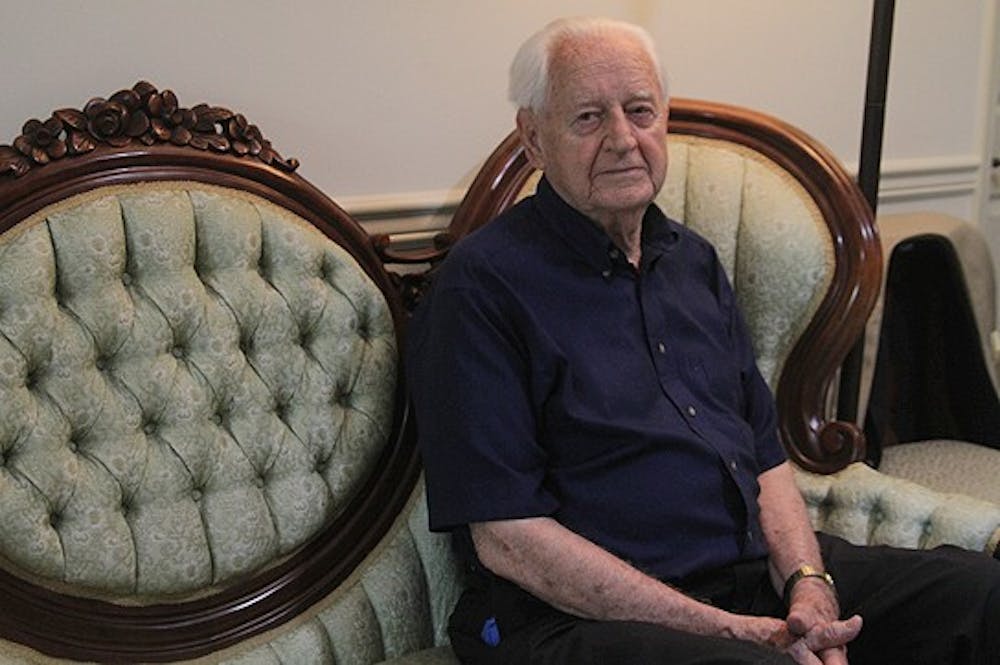Seymour issued a church assignment, this time to Fred Ellis. A church member with four daughters at every level of the school system, Ellis was to run for school board and break the deadlock. Seymour told him that if he declared himself a school board candidate, he would be relieved of his duties as a deacon.
Ellis ran and was elected. At his first meeting, he cast the decisive vote to break the deadlock, leading to the integration of Chapel Hill schools.
From Greenwood to Chapel Hill
Seymour was born in Greenwood, South Carolina in 1925. He graduated from Duke University, after which he attended Yale Divinity School. It was there that Freeman said Seymour understood the teachings of the Bible to be more than simple words or a Sunday appointment.
Freeman said Seymour’s world exploded.
After completing his studies, earning his doctorate in historical theology at the University of Edinburgh, Seymour took on ministerial assignments in Charlotte, Warrenton, Mars Hill – where he met his wife, Pearl Francis – and eventually, Chapel Hill.
Seymour became the first pastor of Olin T. Binkley Memorial Baptist Church in 1958, where he ministered for three decades.
In 1962, the Student Interracial Ministry of Union Theological Seminary in New York ran a program to place students of color in white congregations as interns, and vice versa.
It was through this program that Rev. Dr. James A. Forbes, Jr., senior minister emeritus of Riverside Church in New York, ended up at Binkley Baptist Church as an intern. No other church in the area would accept a Black student.
“You might have felt as if you were his relative,” Forbes said of Seymour. “It's a very unusual thing for Black people to experience white people where the issue of race becomes insignificant in your exchanges.”
Seymour and Forbes shared a lifelong friendship. In 1964, Seymour officiated Forbes' wedding, and his wife, Pearl, played the organ.
Seymour’s words and body were in sync, Forbes said.
To get the day's news and headlines in your inbox each morning, sign up for our email newsletters.
“If he preached about it, he was going to do something to tangibilitate the gospel – to make it real,” he said.
“You Can’t Hold Back the Spring”
In 2017, Ayla Volpe, a Chapel Hill local, took a job walking Seymour’s dog, Pastor.
“People kept saying, ‘He’s a person of note in the community,’ but I didn’t investigate it much further,” she said – yet.
Three years later, Volpe, a documentarian, is putting the finishing touches on a film of Reverend Robert Seymour’s life.
“You Can’t Hold Back the Spring" is named after the original title of Seymour’s book, eventually named “Whites Only” – Seymour’s personal chronicle and social commentary of the segregated South.
In an interview with Roland Giduz, Seymour said that the spring represents the dream of an inclusive society becoming a reality.
The documentary covers Seymour’s early life, his years studying, his life in Chapel Hill and the community projects he supported, including his help founding the Inter-Faith Council for Social Service and his position as president of the Council for seven years.
The film also showcases his advocacy efforts for the local senior population. In 2007, Seymour founded Orange County’s first multi-purpose senior center, the Friends of the Seymour Center.
Regarding his many accomplishments, Volpe said Seymour was unpretentious and open to possibility.
“He just did what he felt was needed, and without any idea of where it would lead,” she said.
Freeman agreed with Volpe, and said Seymour made things change – from his early days quietly and powerfully leading integration efforts, to his later days, still nurturing the seeds he had sown across Chapel Hill.
“I once asked, ‘How do you always know to do the right thing at the right time?’" Freeman said. "He said, ‘There’s a Bible verse, Curtis.’”
@marmorava
city@dailytarheel.com | @DTHCityState



